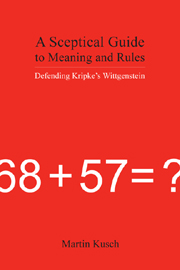Book contents
5 - Factualism and non-factualism
Summary
Introduction
In this and the following two chapters I turn to the main controversies regarding the sceptical solution. In this chapter I discuss the issue of whether the sceptical solution features a credible successor to classical realism; in Chapter 6 I show that the private language argument as rendered by WRPL is defensible; and in Chapter 7 I ask how the sceptical solution relates to semantic primitivism.
The first topic is naturally subdivided into three questions. First, does the sceptical solution propose a factualist or a non-factualist reading of meaning attributions? Secondly, assuming – as the majority view among critics has it – that the sceptical solution offers a non-factualist account of meaning attributions, is the resulting position defensible on systematic grounds? Thirdly, assuming – as only very few interpreters have done – that the sceptical solution is factualist, how does this factualism differ from the factualism that is part and parcel of meaning determinism in general and semantic realism in particular? To anticipate briefly, I shall defend the views that the sceptical solution is factualist in a minimalist sense; that non-factualism about meaning attributions is incoherent; and that whereas meaning-determinist factualism is inflationary, meaning-sceptical factualism is deflationary.
Non-factualism in the sceptical solution
A non-factualist about a certain class of declarative sentences denies that they are “truth-apt” or “fact-apt”: he denies that for any sentence s of this class we can infer “s is true” or “It is a fact that s” from s. Non-factualism is usually a form of projectivism.
- Type
- Chapter
- Information
- A Sceptical Guide to Meaning and RulesDefending Kripke's Wittgenstein, pp. 148 - 176Publisher: Acumen PublishingPrint publication year: 2006

